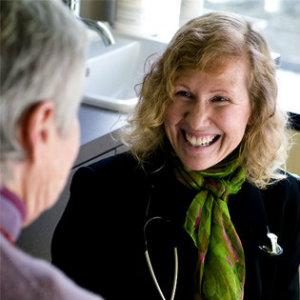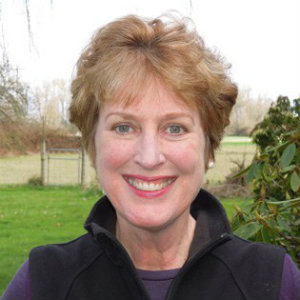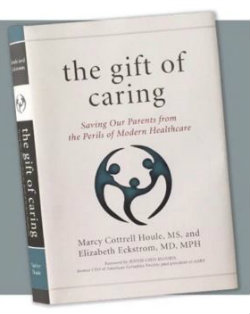 Geriatrician Elizabeth Eckstrom, MD, MPH, shares her professional perspective on caregiving in the book she co-authored, The Gift of Caring.
Geriatrician Elizabeth Eckstrom, MD, MPH, shares her professional perspective on caregiving in the book she co-authored, The Gift of Caring.Valentine’s Day is just around the corner, and gift giving will abound. It makes me think of those who give the gift of selflessly caring for others, such as those family and friends who care for their older adult loved ones.
There are many resources to help these family caregivers. The Gift of Caring: Saving Our Parents from the Perils of Modern Healthcare is one new resource that shares both a personal and professional perspective on caring for older adults.
The book is co-authored by Marcy Cottrell Houle, a biologist and award-winning author who cared for her parents in their last years, and Elizabeth Eckstrom, MD, MPH, associate professor and Director of Geriatrics in the Division of General Internal Medicine and Geriatrics at Oregon Health and Science University in Portland, Oregon.
I recently enjoyed the gift of speaking with Dr. Eckstrom about the book and how the health care system can deliver better care for older adults. We also spoke about issues raised in a recent New York Times article, in which she was prominently featured, on the shortage of geriatricians in the United States.
 Co-author Marcy Cottrell Houle shares stories both heartbreaking and heartwarming about caring for her own parents.
Co-author Marcy Cottrell Houle shares stories both heartbreaking and heartwarming about caring for her own parents.The Gift of Caring shares the challenges of caregiving in a novel format, interspersing deeply personal chapters by Marcy Cottrell Houle on caring for her parents with chapters that offer your professional perspective as a geriatrician. Tell us about why you chose this format.
Marcy’s story was heartbreaking and fraught with tough situations, but also heartwarming, inspiring, and in the end, full of love, hope, and joy. We wanted others to hear her story, because we knew so many people are struggling with similar situations and need reassurance that they are not in this alone. But we also wanted to provide practical tips for many common scenarios caregivers face, and we thought those tips might be easiest to relate to and utilize if they were paired with Marcy’s stories.
In the end, we chose the parts of Marcy’s story that we thought would be most relevant to a broad audience of older adults and their caregivers. Marcy had lots more experiences with her parents—probably enough for another entire book!
 What are the key messages that you want caregivers to take from your book?
What are the key messages that you want caregivers to take from your book?
First, that you don’t have to do this alone. Many others are facing similar situations, and you should reach out to friends, caregiving organizations, your parent’s primary care provider’s team (social workers, nurses, and others) who can offer resources and support.
Second, that it is absolutely vital to care for yourself in the midst of caring for others. Marcy was such a great example of this, and you should not feel guilty about finding some time for self-care.
Third, if the health care system seems to be failing your family member, it probably is. Ask your parent’s primary care provider for help (such as a referral to a geriatrician or geriatric nurse practitioner) and don’t give up until you have the health care team you need. Even if a geriatric specialist is not available, a good team with physician assistants, social workers, pharmacists and others can provide immeasurable help as well.
Houle’s parents benefit from a supportive daughter with access to the appropriate resources. What do you recommend to those without?
Many older adults in our country have no family members or financial resources to access the many services they need. I recommend two solutions to this problem:
- Most primary care practices are not aware of the long-term services and supports available in their communities, and really need to connect with these services. The Aging and Disability Resource Centers are just one example of an excellent resource that older adults can tap into.
- Older adults can connect with services themselves through senior centers and other community organizations. Many older adults feel these services are “not for them,” but often do find they can be very helpful.
You were featured in an article in the New York Times in January on the shortage of geriatricians in this country. What are your thoughts on the lack of health care professionals competent to care for our aging society?
We are already in a critical shortage of professionals trained to care for older adults. This includes geriatricians, but also primary care providers (physicians, nurse practitioners, physician assistants), pharmacists, nurses, social workers, and other health professionals. As our population ages, this shortage will lead to suboptimal care for many older adults. This crisis needs to be addressed at the policy level with improved reimbursement for the care of older adults, as well as increased funding to train health care professionals to be proficient at caring for older adults.
A modest investment in this workforce would markedly reduce the long-term costs of health care in our country because older adults would receive higher-quality, cost-effective care rather than the excessive care that many currently receive in their later years. The Institute of Medicine (IOM) report “Retooling for an Aging America” in 2008 outlined many important steps, but little has happened since then. We need a cultural shift to improve health, reduce disability, and optimize quality of life for our older population.
For more on the New York Times article on the geriatrician shortage, please read John A. Hartford Foundation President Terry Fulmer's Health AGEnda post: Telling Our Story.
